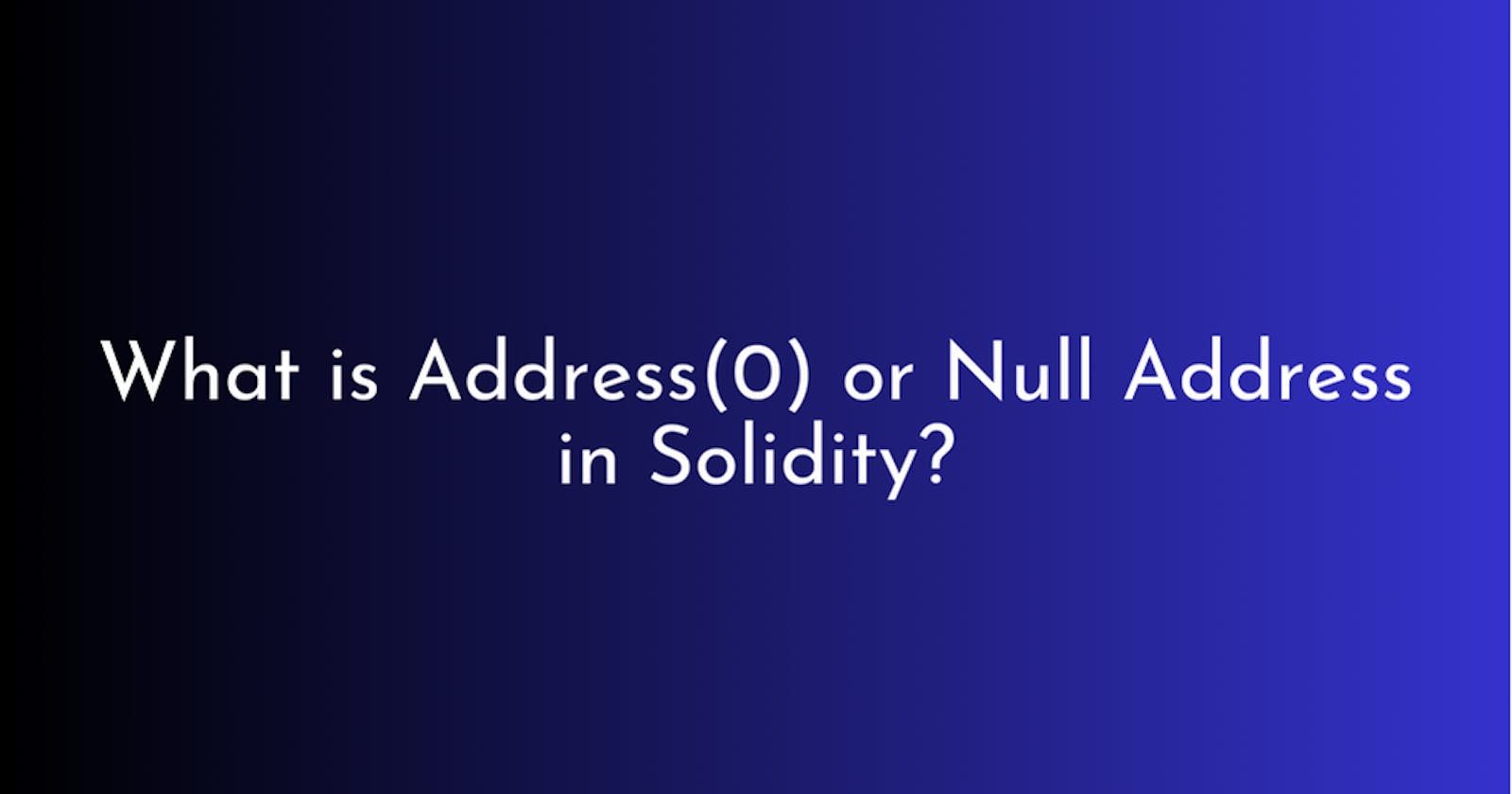Introduction
In the exciting realm of Ethereum and smart contracts, the concept of Address(0) stands as a fascinating enigma, often referred to as the “null address” or “zero address.” But what exactly is Address(0), and why does it hold such a unique position within the Ethereum network?
Let’s embark on a journey to unravel the mysteries of Address(0) and discover its significance in Solidity.
The Zero Address: An Ethereum Oddity
Imagine an address unlike any other, where every byte is set to zero. That’s address(0) for you, denoted as 0x0 or 0x0000000000000000000000000000 in Ethereum’s hexadecimal language. Despite its seemingly vacant nature, address(0) carries profound implications within the Ethereum ecosystem.
Similar to any other address, it can accept transactions. However, tokens sent to the zero address become irretrievable since there’s no mechanism to execute transactions from this address to transfer the tokens out.
It serves as a placeholder for uninitialized or burn addresses, symbolizing a void where tokens vanish into the ether, never to return. It is exactly how default assignment works in any other programming language, being either zero or null values.
// SPDX-License-Identifier: MIT
pragma solidity 0.8.25;
contract ZeroAddress{
address public emptyAddress = address(0);
}
The Importance of Address(0)
Can be used as default value for address type
In Solidity, when variables of type address are left uninitialised, they are automatically set to the value address(0).
Imagine you’ve got a variable named myAddress waiting eagerly to be assigned a purpose. If left uninitialised, fear not, for Solidity graciously bestows upon it the value of address(0).
// SPDX-License-Identifier: MIT
pragma solidity 0.8.25;
contract Test {
address public myAddress;
uint256 public value;
constructor(uint256 testValue) {
value = testValue;
// myAddress is automatically set to Address(0)
}
}
**Using Address(0) as a Signal for Uninitialized or Invalid Addresses
**Ah, but the zero address is not merely a placeholder; it serves as a vigilant guardian against uninitialized or invalid addresses. Smart contracts leverage this unique feature to ensure the validity of addresses before proceeding with critical operations. By checking if a variable holds the value of address(0), contracts can safeguard against unintended behaviors or vulnerabilities arising from uninitialized addresses or invalid addresses.
For example, consider a scenario where a smart contract needs to confirm the legitimacy of a recipient address before proceeding with a transfer. Verifying the address prevents mistakenly sending tokens to a null or invalid address — essentially losing the tokens forever, like tossing them into the void.
// SPDX-License-Identifier: MIT
pragma solidity ^0.8.25;
contract Test {
mapping(address => uint256) public balances;
function transfer(address receiverAddress, uint256 amount) public {
// check for amount validity
require(balances[msg.sender] >= amount, "Not enough tokens");
// check for address validity
require(receiverAddress != address(0), "Invalid recipient Address");
// transfer tokens
balances[msg.sender] -= amount;
balances[receiverAddress] += amount;
}
}
In this particular case, let’s ensure that the transfer function verifies that the recipient address (receiverAddress) isn’t address(0) before proceeding with the token transfer. If the receiverAddress turns out to be address(0) , the function will half and revert with an error message stating that the address is invalid.
Handling contract interactions
In contract interactions, functions returning address types may use address(0) as a sentinel value to indicate unsuccessful operations or situations where a valid address couldn't be obtained.
// SPDX-License-Identifier: MIT
pragma solidity ^0.8.25;
contract ExternalContract {
function getExternalAddress() public returns(address){
// We can simulate unsuccessful operations
// by returning address(0)
return address(0);
}
}
contract SampleInteraction {
function interactWithExternal(address _contractAddr) public returns (address) {
ExternalContract extContract = ExternalContract(_contractAddr);
address retrievedAddr = extContract.getExternalAddress();
if (retrievedAddr == address(0)) {
revert("Error: External address not found");
}
return retrievedAddr;
}
}
In this example, the interactWithExternal function within the InteractionExample contract aims to communicate with an external contract to fetch an address. If the operation encounters a failure and address(0) is returned, the function aborts the transaction, reverting it with a descriptive error message. This mechanism ensures robust error handling when interacting with external contracts, maintaining transaction integrity and providing clear feedback in case of failures.
Checking for invalid or zero address while using Yul (inline assembly)
Examples:
// YUL
if (iszero(testAddress)) {
// iszero returns a boolean.
// true if testAddress is address(0), otherwise false
} else {
// do something else if testAddress is not zero
}
// YUL
if (testAddress == 0x0) {
// checks if testAddress is zero address
} else {
// do something else if testAddress is not zero
}
Wrapping Up
And there you have it, fellow Ethereum enthusiasts! The zero address, a cryptic entity with a myriad of roles within the Solidity ecosystem. From its humble origins as a default value to its pivotal role in error handling, address(0) stands as a testament to Ethereum’s versatility and ingenuity.
So, the next time you encounter this mystical address lurking within a smart contract or transaction, remember its significance and marvel at the intricacies of Ethereum’s blockchain ballet. After all, in a world where every bit counts, even the void holds its own allure.
